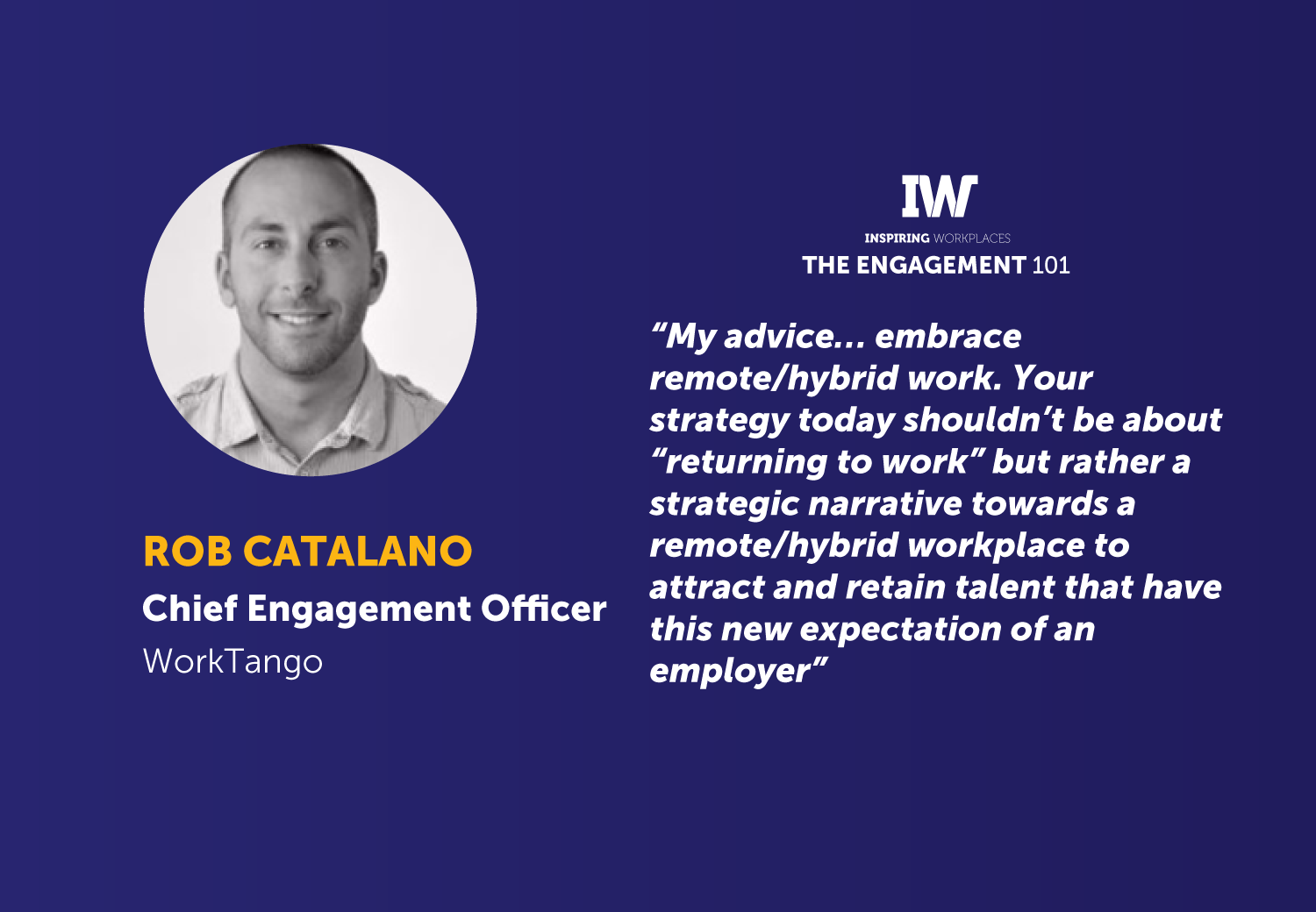
24th May 2021
How to return to the workplace (or not) – in a post covid world – Rob Catalano

This snippet is part of our Ebook How to return to the workplace (or not) – in a post covid world. Advice and suggestions from our Top 101 influencers. You can download the full eBook with all the advice here.
Rob Catalano, Chief Engagement Officer, WorkTango
Let’s be honest, “return to the office” isn’t by any means returning back to “normal”. The constructs of a workplace that we’re used to, in my opinion, is going to be very different. As powerhouse organizations like Google, Shopify, Twitter and many others start to shift to remote-only or hybrid workplaces, the narrative needs to shift to enabling a more flexible and hybrid workplace. The future of your workplace and talent depends on how companies navigate through the upcoming year.
And if you don’t believe me, this remote/hybrid workplace is happening… A recent Gartner Survey finds 90% of HR Leaders will allow employees to work remotely even after a COVID-19 Vaccine is available.
And if this worries HR or organizations, they shouldn’t be worried. They should feel inspired and confident. If you reflect on the past year, organizations have shifted with agility and went remote despite what they thought wasn’t possible (or it was a two-year plan). And in many cases, the shift to remote happened in a matter of weeks.
My advice… embrace remote/hybrid work. Your strategy today shouldn’t be about “returning to work” but rather a strategic narrative towards a remote/hybrid workplace to attract and retain talent that have this new expectation of an employer. And it’s not all about making employees happy – when you think about important considerations such as hiring a talented workforce, creating a diverse workforce, and fostering an engaged workforce… this becomes a lot easier for organizations willing to embrace this idea of a remote or hybrid workplace.
A couple of things to consider in this shift:
- Establish new “rules of engagement” – build expectations around working hours and when employees are expected to be available for rhythm meetings (and when it’s not expected). Define what communication channels are appropriate for regular conversations or when help is needed. A remote or hybrid workplace requires flexibility.
- Set a foundation of success starting by enabling your leaders – antiquated HR practices such as annual appraisals and annual engagement surveys do not offer insights or accountability for leaders in your organization. Modernizing you process around a more structured rhythm and more frequent insights enables leaders to focus on engagement and performance of their teams. HR can’t own it whether employees are in an office or remote.
- Trust your employees, period. – employees make 35,000 decisions a day. They’re making them in or out of your office. That trust level and flexibility goes a long way in developing an engaged and productive workforce. It’s embarrassing that the market for software tracking employees has gone up during COVID – these companies have immediately lost trust and faith from their employee-base.
- Address burnout – a real impact of remote work is burnout. No boundaries from work and being ‘always on’ should be concerns. Build policies to address this. One of my favourite: “if you’re wired, you’re fired.” Some organizations require employees to be offline and not able to check emails while away… in fact, out of office replies share that emails will not be checked and deleted before an employee starts again. This removes the stress of feeling the need to be always available and allow real opportunities for relaxing and recharging.
One final consideration is that regardless of whether your employees are at home, at the office, in a coffee shop or anywhere else…all the factors that influence engagement of employees still apply. There still needs to be great communication, leadership, empathy, gratitude and focus on personal and professional development. Don’t forget the fundamentals when it comes to helping build an experience where employees, and in turn your company, can succeed.

